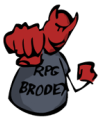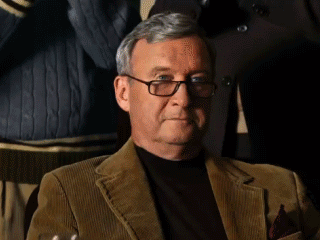Tags: Games journalism
We at the RPG Codex rarely run editorials; it's mostly always DU with another of his "Year in Review" articles. This time, however, it's different. First, it's grotsnik, not DarkUnderlord. Secondly, it's the ongoing games journalism debacle - because what else but a scandal could make us get off our arse and (ask grotsnik to) actually do an editorial?
I'd really like to quote it in full right here, but I can't. So have a lengthy excerpt:
Be sure to read the full article: RPG Codex Editorial: Games Journalism Scandal
We thank grotsnik for writing up this article for us.
We at the RPG Codex rarely run editorials; it's mostly always DU with another of his "Year in Review" articles. This time, however, it's different. First, it's grotsnik, not DarkUnderlord. Secondly, it's the ongoing games journalism debacle - because what else but a scandal could make us get off our arse and (ask grotsnik to) actually do an editorial?
I'd really like to quote it in full right here, but I can't. So have a lengthy excerpt:
Spare a thought for these wronged souls; it really must be irritating to keep on hearing that same tired old canard about misconduct, foul play and publisher influence in gaming journalism, just because a journalist, having made the tentative suggestion that somebody (who after five minutes of investigation turned out to have worked for Square Enix) was reviewing Square Enix games while cheerleading Square Enix products and that might look a bit bad to some people, was immediately dogpiled upon, rubbished, and censored by his own colleagues. And actually, the journalists (such as RPG Codex alumnus, games critic, and amateur PR man Ian Miles Cheong) who bleated that ordinary gamers didn’t have the whole story and were just wildly speculating as usual based on what little they could see of the inner workings of the media, are quite right to say as much. Ordinary gamers don’t know exactly how much journalists allow themselves to be affected by publisher influence, possibly because ordinary gamers don’t put in the hours at the publicists’ parties, preview events and launch events, or the various free publicist-organised jollies at castles, hovercraft classes, nightclubs, Porsche driving schools, etc, that would be required to make a fully-informed judgement on this subject. Ordinary gamers can't witness first-hand whether reporters are gently implicitly nudged towards favourable judgements, or, as in the case of Wainwright, whether they appear to have a blatantly obvious bias based upon personal relationships and career hopes; all they can see is the plethora of near-perfect scores and the meaningless superlatives that are farted out from the back end of the press machine with a disheartening regularity. All that ordinary gamers have to go on is the image the gaming media presents, which, to put it mildly, does not inspire confidence - and, every so often, a toxic story or memoir that comes seeping out through the cracks.
This is the real, harmful, bloody-minded naivety of the gaming media community; a collectively-affirmed belief that their closeness with the industry makes them specially qualified to pass judgement upon it, without being able to accept that it might also have legitimately compromised their opinions - a little in the manner of a mother who believes it’s perfectly okay for her to be a juror at her son’s murder trial because she knows him much better than anybody else. And this translates into a defensiveness on behalf of the entire profession; Klepek's article, and to a lesser extent Sterling's, takes a moment to acknowledge the inexcusable (of course it isn't right to consult with a company whose products you're reviewing) before avoiding any in-depth commentary on this undeniable glimpse of an industry operating like a swingers' party - in which journalists are invited to become PR reps by PR reps at PR events, transform into creative consultants, then turn into reporters again, jumping back and forth directly between poacher and gamekeeper without ever having their credibility questioned until a bunch of internet detectives on Neogaf happen to notice their CV details - in favour of abstracts and private reflection; really, this story is all about trust between you and me. Really, it's all about how us critics sometimes can't take criticism. Even John Walker and Rob Florence themselves issued milquetoast oil-on-troubled-waters follow-ups to their initial condemnatory statements, urging the gaming public not to think too badly of gaming journalism as a whole, since from personal experience they can testify that most of the people they know are hardworking, decent, and trustworthy.
It’s a pity. Because what the Walkers and Florences (who must genuinely want to improve the situation, indeed, who wouldn’t have spoken out in the first place if they weren't passionate about doing so) have to understand is that for them to start producing apologetics on behalf of a silent majority of honest hacks is completely futile, since nobody believes that every single gaming journalist is corrupt. What people believe is that gaming journalism is institutionally corrupt, built around an imbalanced professional relationship that frequently challenges (and, if appearances are anything to go by, frequently overcomes) writers' principles, and this image is not going to improve as a result of journalists penning earnest columns about how, a few bad apples aside, in their personal experience journalists are honest, (honest!). This image is going to improve if the wider public is provided with tangible evidence that games criticism can occur in a reasonably effective vacuum - that the clowns who announce quite gleefully that they're riding the gravy train of expensive press tours, who copy-paste press statements into their articles and use the word ‘awesome’ in their ‘previews’ and who think they might get a job in the industry themselves one day because that nice PR man gave them a business card are not the same people providing supposedly in-depth objective analysis of any commercial product, that critics are sending back or at the very least declaring the free tat they’ve been plied with (no, saying after the event that you’d meant to give it to charity all along doesn’t count), that editors never have the ability to alter review scores or excise harsh criticism, that advertising is entirely divorced from the journalistic process - and that writers can and will speak up and be heard by the public whenever they encounter misconduct both on the part of the industry and on the part of their peers. Continuing to say, ‘You don’t have the full story, but we do, and we’re telling you that aside from the specific stuff that you already know about, everything is fine, trust us,’ after everything that’s happened, is simply indefensible.
This is the real, harmful, bloody-minded naivety of the gaming media community; a collectively-affirmed belief that their closeness with the industry makes them specially qualified to pass judgement upon it, without being able to accept that it might also have legitimately compromised their opinions - a little in the manner of a mother who believes it’s perfectly okay for her to be a juror at her son’s murder trial because she knows him much better than anybody else. And this translates into a defensiveness on behalf of the entire profession; Klepek's article, and to a lesser extent Sterling's, takes a moment to acknowledge the inexcusable (of course it isn't right to consult with a company whose products you're reviewing) before avoiding any in-depth commentary on this undeniable glimpse of an industry operating like a swingers' party - in which journalists are invited to become PR reps by PR reps at PR events, transform into creative consultants, then turn into reporters again, jumping back and forth directly between poacher and gamekeeper without ever having their credibility questioned until a bunch of internet detectives on Neogaf happen to notice their CV details - in favour of abstracts and private reflection; really, this story is all about trust between you and me. Really, it's all about how us critics sometimes can't take criticism. Even John Walker and Rob Florence themselves issued milquetoast oil-on-troubled-waters follow-ups to their initial condemnatory statements, urging the gaming public not to think too badly of gaming journalism as a whole, since from personal experience they can testify that most of the people they know are hardworking, decent, and trustworthy.
It’s a pity. Because what the Walkers and Florences (who must genuinely want to improve the situation, indeed, who wouldn’t have spoken out in the first place if they weren't passionate about doing so) have to understand is that for them to start producing apologetics on behalf of a silent majority of honest hacks is completely futile, since nobody believes that every single gaming journalist is corrupt. What people believe is that gaming journalism is institutionally corrupt, built around an imbalanced professional relationship that frequently challenges (and, if appearances are anything to go by, frequently overcomes) writers' principles, and this image is not going to improve as a result of journalists penning earnest columns about how, a few bad apples aside, in their personal experience journalists are honest, (honest!). This image is going to improve if the wider public is provided with tangible evidence that games criticism can occur in a reasonably effective vacuum - that the clowns who announce quite gleefully that they're riding the gravy train of expensive press tours, who copy-paste press statements into their articles and use the word ‘awesome’ in their ‘previews’ and who think they might get a job in the industry themselves one day because that nice PR man gave them a business card are not the same people providing supposedly in-depth objective analysis of any commercial product, that critics are sending back or at the very least declaring the free tat they’ve been plied with (no, saying after the event that you’d meant to give it to charity all along doesn’t count), that editors never have the ability to alter review scores or excise harsh criticism, that advertising is entirely divorced from the journalistic process - and that writers can and will speak up and be heard by the public whenever they encounter misconduct both on the part of the industry and on the part of their peers. Continuing to say, ‘You don’t have the full story, but we do, and we’re telling you that aside from the specific stuff that you already know about, everything is fine, trust us,’ after everything that’s happened, is simply indefensible.
Be sure to read the full article: RPG Codex Editorial: Games Journalism Scandal
We thank grotsnik for writing up this article for us.







![Have Many Potato [2013] Codex 2013](/forums/smiles/campaign_tags/campaign_potato2013.png)
![The Year of Incline [2014] Codex 2014](/forums/smiles/campaign_tags/campaign_incline2014.png)



















 Grotsnik, this read like a summary of a season of The Bold and the Beautiful.
Grotsnik, this read like a summary of a season of The Bold and the Beautiful.



![Glory to Codexia! [2012] Codex 2012](/forums/smiles/campaign_tags/campaign_slushfund2012.png)
 Well done good sir.
Well done good sir.







